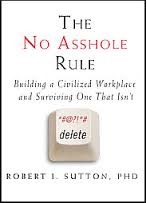I’ve been reading a book used in many college business classes and  based on by Stanford Business Professor Robert Sutton, PhD , called The No Asshole Rule. He developed the book from apopular article he wrote for The Harvard Business Review. Both texts have been well received by business leaders and academics alike despite it’s rather gratuitous use of the “A” word. The book came to mind after a frank, matter-of-fact, discussion with a colleague about a particularly difficult customer. My most senior colleague noted that in the dealings of others outside our institution the customer’s attitude, behavior and deportment were toxic and challenging, but he made is point much clearer in more concise language.
based on by Stanford Business Professor Robert Sutton, PhD , called The No Asshole Rule. He developed the book from apopular article he wrote for The Harvard Business Review. Both texts have been well received by business leaders and academics alike despite it’s rather gratuitous use of the “A” word. The book came to mind after a frank, matter-of-fact, discussion with a colleague about a particularly difficult customer. My most senior colleague noted that in the dealings of others outside our institution the customer’s attitude, behavior and deportment were toxic and challenging, but he made is point much clearer in more concise language.
Sutton acknowledges that, “Nearly all of us act like assholes at times” (11), and cautions us that it,
is far harder to qualify as a certified asshole: a person needs to display a persistent pattern, to have a history of episodes that end with one “target” after another feeling belittled, put down, humiliated, disrespected, oppressed, de-energized, and generally worse about themselves.
I like that he includes a list of identifiable characteristics of assholes, and he devised a test that Dell computers modified for senior executives to give their subordinates. Though it may well be a terrible and dangerous idea, I may try that in my class. Indeed, “The Upshot: Asshole, Know Thyself” he counsels “to keep your inner asshole from getting out, you need to be aware of places and people that will turn you into an asshole” (116). I’ve heard other counselors in faculty workshops advise us to know our triggers and find ways to avoid those situations. I’ve reacted rashly to use of cell phones in the classroom throughout my career, I also tend to respond disproportionately when students walk behind me unnecessarily, or come too close to (or even behind) my desk. I might have a larger space bubble, and there’s a danger of my using sarcasm as a defense system. It’s possible that a sharp tongue is a by-product of a life spent reading, but I look at some of colleagues and realize that can’t necessarily be the case. The instructors I’ve been interviewing as part of this self-evaluation and analysis of andragogy (ie Dr. Steve Gerson, Kristy Howell and others) demonstrate a concern and gentle candor. And in reading formal essays, lack of headings or work under word count unduly irritate me and can result in less measured and tactful responses. I also can misread ambiguity in email and have to read carefully rather than quickly and wait to respond to make sure everything is 1) good 2) necessary and 3) kind. I try.
I think I was attracted to language sounded like the “ring of truth” (or verisimilitude – if I thought I could use that word without sounding like a pretentious ass) even if it might trigger a more gentle reader. I may at first have looked for information about others, but quickly I found myself examining my behaviors, thoughts and actions.
Works Cited
Sutton, Robert. The No Asshole Rule. New York: Business Plus, 2010. Print